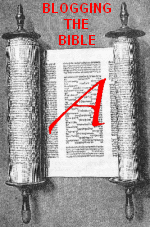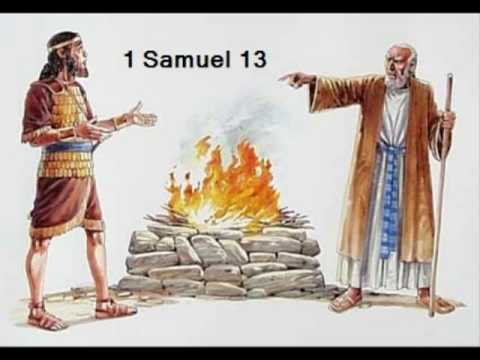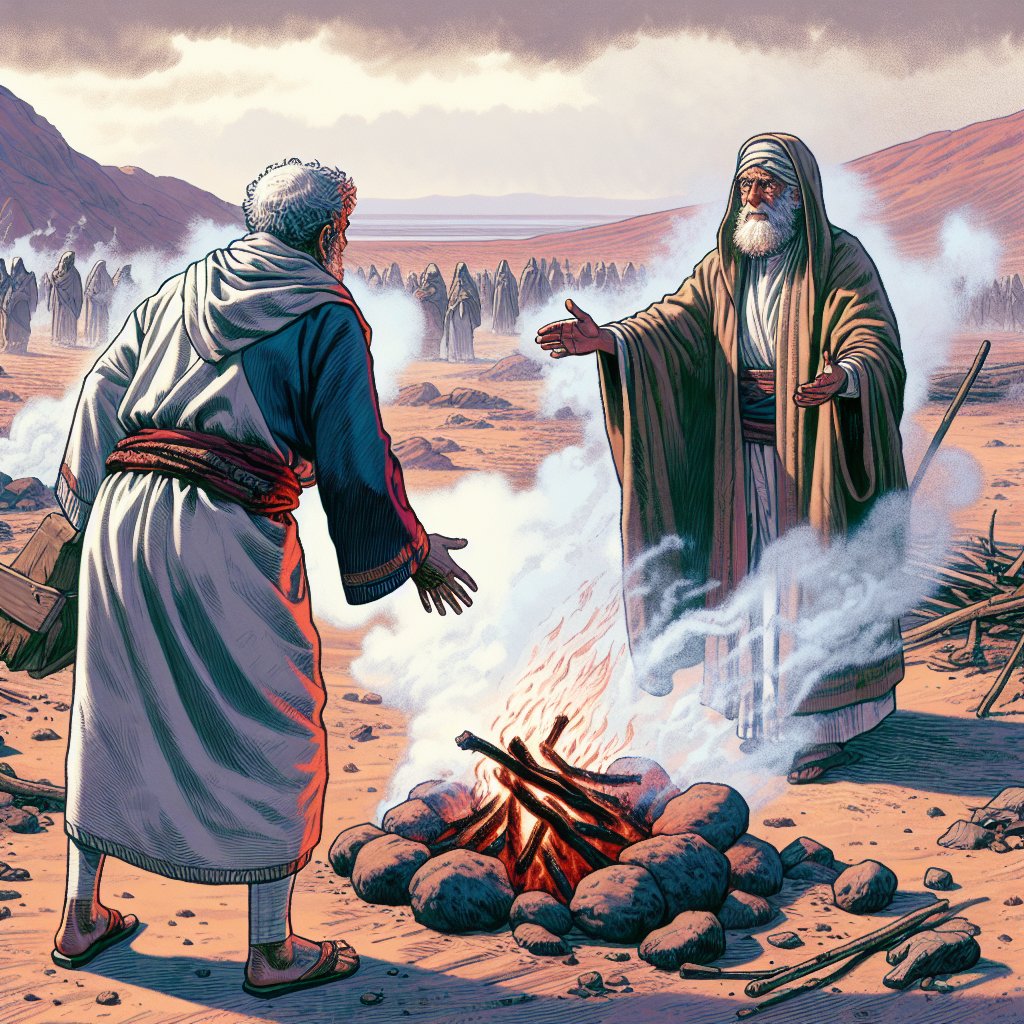Just Who Was Ruling Over Israel?
 The book of Samuel now takes an interesting turn and sorta pulls the rug out from under you. Chapters 1-12 depict a relatively independent Israel that has just chosen Saul for itself as king. Now, it turns out that all this time, the Israelites were also subjugated by their old enemy the Philistines, and the Philistines were the real overlords of the land. To be fair, the previous book (chronologically) is Judges, and the last judge it describes is the famous Samson. Samson is — ironically enough — the world’s first suicide bomber (more on that in a future post). He used his immense strength to collapse the Philistine temple he was being showed off in when he was captured, thereby killing himself and more Philistines than he had killed previously in his life. (Which is a lot.) In any case, it does not say that this ended the Philistines’ subjugation of Israel and nothing more is spoken from the start of Samuel up to this point.
The book of Samuel now takes an interesting turn and sorta pulls the rug out from under you. Chapters 1-12 depict a relatively independent Israel that has just chosen Saul for itself as king. Now, it turns out that all this time, the Israelites were also subjugated by their old enemy the Philistines, and the Philistines were the real overlords of the land. To be fair, the previous book (chronologically) is Judges, and the last judge it describes is the famous Samson. Samson is — ironically enough — the world’s first suicide bomber (more on that in a future post). He used his immense strength to collapse the Philistine temple he was being showed off in when he was captured, thereby killing himself and more Philistines than he had killed previously in his life. (Which is a lot.) In any case, it does not say that this ended the Philistines’ subjugation of Israel and nothing more is spoken from the start of Samuel up to this point.
Still, the fact that a new book does not mention that the Philistines were overlords brings up a curious thing about the historical/narrative books of the Hebrew Bible (Joshua, Judges, 1+2 Samuel, 1+2 Kings). At the end of the Deuteronomy, when the Israelites are about to go in and capture Israel, YHWH keeps exhorting them to utterly wipe out the seven nations living in the land, destroy their altars, spare nobody etc etc. Time and time again, the Bible gives the impression that this or that nation has finally been defeated, tens of thousands slaughtered and the Israelites have finally secured another part of the promised land. And yet, some time later, the same nation pops up again. It’s not a definite contradiction (eg. saying “the Philistines were utterly wiped out” and then the Philistines coming back a book later) but there’s a definite impression. It looks like the Israelites’ failure to conquer the entire land and kill everyone else was an embarrassment to the authors, so perhaps they’ve given themselves some fake victories over tens of thousands as a breather before the same nation pops up and must be genocided again.

Saul’s Stuffup
In any case, this whole time the Philistines were overlords. Saul’s son Jonathan strikes down a Philistine prefect and thereby arouses the wrath of entire Philistine army, who decide to teach Israel a lesson. The Israelites flee and hide in every nook and cranny they can find in anticipation of a massacre. However, Saul, driven on by his previous victory, wants to take Israel into a campaign against them. He waits for Samuel for 7 days to make a sacrifice but when Samuel is slightly late, he performs the sacrifice himself*. Samuel shows up minutes later, and he’s not impressed:
You acted foolishly in not keeping the commandments that the LORD your God laid upon you! Otherwise the LORD would have established your dynasty over Israel forever. But now your dynasty will not endure. The LORD will seek out a man after His own heart, and the LORD will appoint him ruler over His people, because you did not abide by what the LORD had commanded you. (v13-14)
Problems With Saul’s Stuffup
I think the silliness speaks for itself, but let’s look at a the fairly extensive list of problems with Samuel’s pronouncement.
- The whole passage sets Saul up as a failed king who is to be shortly replaced by the “hero” David (I assume this is well known enough not to need a spoiler alert). Of course as we’ll find out later David also “acts foolishly in not keeping the commandments of the LORD,” even according to the authors of this very book of the Bible! So there’s some confusion here.
- According to the Rabbinnic commentaries, Saul as a non-priest could perform this sacrifice because it was on a high altar (private altars being allowed in this period as the Temple not having been built yet). Leaving the details of this law aside, this appears to show that Samuel is simply being petty about a perceived personal slight on Saul’s behalf. Like many other times when someone in the Bible is blamed for something, nowhere does the text does not spell out that Saul waiting for Samuel was more than a common courtesy, one which (as Saul explains to Samuel) was overruled by the urgency of the pre-battle sacrifice.
- As with other pronouncements of establishing a dynasty “forever”, does this mean Orthodox Jews should blame Saul for causing the exile of the Jews from Israel? After all, if his dynasty was established forever, presumably it would have meant no dispersal of Jews by the Babylonians and then the Romans, no 2000 year stint in the diaspora, no pogroms, no massacres, maybe even no Holocaust? And to think, all of this happened because Saul didn’t have the patience to wait an extra five minutes!
- This seems to be another case of YHWH changing his mind. In any case, does it even make sense to have an “if/then” type prophecy coming from omniscient deity? Of course the natural answer is that from the text, the YHWH of Samuel is anything but omniscient.
- The individual doesn’t exist. A clan, a tribe, a family is a single organ. It seems this really was believed which is why people were genuinely ok with collective punishment, punishing whole families etc. This is still the norm for many people today, who see others almost entirely in terms of ethnicity — including what “your” ancestors did to “mine”.
Now as for the military campaign—[to be continued]
*This chapter has quite a few errors in the text, the most interesting one is where Rashi himself (the classic Orthodox Jewish Bible commentator) admits the error. This is the verse: And he waited seven days, to the appointed time which Samuel [had set], and Samuel did not come to Gilgal, and the people scattered from him. Rashi’s comment on this verse is: This is a short verse, with one word missing. ([We must explain:] to the appointed time which Samuel had set, or to the appointed time of Samuel.





0 Comments